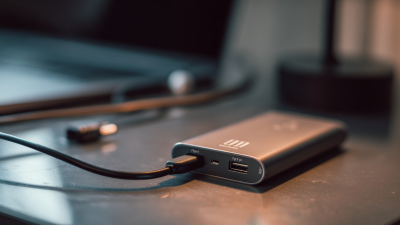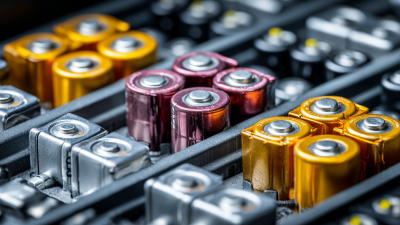How to Choose the Right Lithium Battery for Your Device
Table of Contents
- Understanding the Different Types of Lithium Batteries Available
- Key Factors to Consider When Choosing a Lithium Battery
- Compatibility: Ensuring Battery Fits Your Device Requirements
- Evaluating Capacity and Performance for Optimal Usage
- Safety Features: Choosing a Battery with Proper Protections
- Cost vs. Quality: Making an Informed Financial Decision
- FAQS
- Conclusion
- Related Posts
In today's tech-driven world, the demand for
Lithium Batteries has surged dramatically,
with the global lithium-ion battery market projected to reach
$100 billion by 2025, primarily fueled by advancements
in energy storage solutions and electric vehicle technology.
 Roofer Electronics Technology (Shanwei) Co., Ltd. boasts over
27 years of expertise in the research and
development, manufacturing, and provision of tailored solutions
for lithium batteries and energy storage systems. Our products
are extensively utilized across various sectors, including
household energy storage,
lead-acid replacement lithium batteries, power tools, electric
bicycles, and household appliances. As the market evolves,
understanding how to choose the right lithium battery for your
specific device becomes crucial for optimizing
performance, safety, and efficiency.
This guide aims to provide essential insights into selecting
the ideal lithium battery tailored to your needs, ensuring you
harness the full potential of this transformative technology.
Roofer Electronics Technology (Shanwei) Co., Ltd. boasts over
27 years of expertise in the research and
development, manufacturing, and provision of tailored solutions
for lithium batteries and energy storage systems. Our products
are extensively utilized across various sectors, including
household energy storage,
lead-acid replacement lithium batteries, power tools, electric
bicycles, and household appliances. As the market evolves,
understanding how to choose the right lithium battery for your
specific device becomes crucial for optimizing
performance, safety, and efficiency.
This guide aims to provide essential insights into selecting
the ideal lithium battery tailored to your needs, ensuring you
harness the full potential of this transformative technology.
Understanding the Different Types of Lithium Batteries Available
When selecting the right lithium battery for your device, it is crucial to understand the different types of lithium batteries available. Lithium-ion batteries (LIBs) are the most common, known for their high energy density and efficiency in powering a wide range of electronics. These batteries excel in applications requiring sustained energy delivery, making them a preferred choice in mobile devices and electric vehicles. Innovations in lithium-ion technology, such as layered lithium-rich oxides, have further enhanced performance by offering increased capacity compared to traditional options.
Beyond lithium-ion, other variations like lithium iron phosphate (LFP) and nickel manganese cobalt (NMC) batteries are noteworthy. LFP batteries provide excellent thermal stability and safety, suitable for applications where longevity and consistency are paramount. On the other hand, NMC batteries typically offer greater energy density, making them favorable for high-performance applications. Each battery type comes with unique attributes regarding energy density, power output, and safety features, which should be carefully considered when choosing the right battery for specific device requirements. Understanding these distinctions is essential for making informed decisions that align with your device's operational demands.
Key Factors to Consider When Choosing a Lithium Battery
When selecting the right lithium battery for your device, several critical factors should be taken into account to ensure optimal performance and longevity. First, the chemistry of the battery plays a significant role. Different lithium chemistries, such as Lithium Cobalt Oxide or Lithium Iron Phosphate, offer varying energy densities and thermal stability, which can affect the device's efficiency and safety. For instance, devices requiring high energy output may benefit from batteries with higher energy densities, while applications needing enhanced thermal stability might be better suited to Lithium Iron Phosphate.
Another key consideration is the battery's cycle life, which refers to the number of charge and discharge cycles the battery can endure before its capacity significantly degrades. A longer cycle life is crucial for devices that undergo frequent charging, as it affects the overall cost and maintenance of the device. Additionally, it is important to evaluate the battery's operating temperature range, as extreme temperatures can impact performance and safety. By carefully assessing these factors, you can choose a lithium battery that meets the specific demands of your device, ensuring reliable operation and extended service life.
How to Choose the Right Lithium Battery for Your Device - Key Factors to Consider When Choosing a Lithium Battery
| Key Factor | Example Criteria | Impact on Device |
|---|---|---|
| Capacity (mAh) | 1000mAh, 2000mAh, 4000mAh | Determines usage time without recharging |
| Voltage (V) | 3.7V, 7.4V, 11.1V | Compatibility with device's power requirements |
| Size and Form Factor | 18650, 21700, custom sizes | Fit within the device housing |
| Discharge Rate (C Rating) | 1C, 3C, 5C | Ability to supply high current when needed |
| Cycle Life | 300, 500, 1000 cycles | Longevity and replacement frequency |
| Temperature Range | -20°C to 60°C | Performance in different environmental conditions |
Compatibility: Ensuring Battery Fits Your Device Requirements
 When choosing a lithium battery for your device, compatibility is crucial. Not every lithium battery is designed to fit every device, and using the wrong one can cause malfunction or even damage. Start by checking your device's specifications, including voltage, size, and capacity requirements. This will help you narrow down your options and ensure that the battery you select will work efficiently and safely.
When choosing a lithium battery for your device, compatibility is crucial. Not every lithium battery is designed to fit every device, and using the wrong one can cause malfunction or even damage. Start by checking your device's specifications, including voltage, size, and capacity requirements. This will help you narrow down your options and ensure that the battery you select will work efficiently and safely.
Tips: Always look for the manufacturer's recommendations for battery types. Devices often have model numbers that correspond to specific battery designs. Additionally, measure the physical dimensions of your current battery to avoid any fitting issues. If you're unsure, seeking guidance from a professional or the device's customer service can save you time and potential harm to your device.
Moreover, understanding the chemistry and performance characteristics of lithium batteries can further aid in making the right choice. For instance, some devices may require batteries with higher discharge rates or specific cycle life. Researching these factors will provide a better match for your device's operational needs, ensuring longevity and reliability.
Evaluating Capacity and Performance for Optimal Usage
When selecting a lithium battery for your device, evaluating its capacity and performance is crucial for optimal usage. Capacity, typically measured in ampere-hours (Ah), indicates how much charge the battery can store. A higher capacity generally means longer usage time between charges. However, it’s essential to consider how the device's power consumption correlates with the battery’s capacity. For devices that draw significant current, a battery with a suitable capacity ensures that it can meet demands without depleting too quickly.

Performance factors, such as discharge rates and cycle life, also play a vital role in battery selection. Discharge rates determine how quickly a battery can release energy—critical for devices requiring bursts of power. Furthermore, cycle life refers to the number of charge and discharge cycles a battery can undergo before its capacity significantly diminishes. Evaluating these performance metrics in relation to your device's specifications will help ensure that you choose a lithium battery capable of delivering consistent power and longevity, ultimately enhancing the efficiency and reliability of your device.
Safety Features: Choosing a Battery with Proper Protections
When selecting a lithium battery for your device, safety features must be a top priority.
According to a report by Allied Market Research, the global lithium-ion battery market size is expected to reach $129 billion by 2027, highlighting the industry's rapid expansion and the growing importance of safety in battery technology. Batteries should be equipped with multiple protection mechanisms such as over-voltage protection, over-current protection, and short-circuit protection to prevent potential hazards like fires or explosions.
Tips: Always opt for batteries that comply with international safety standards, such as the IEC 62133 certification, which ensures rigorous testing for safety and performance. Additionally, consider batteries that come with built-in thermal management systems to prevent overheating, a common issue with lithium batteries.
Furthermore, it's essential to select batteries from reputable manufacturers with a proven track record in safety. A study from the National Renewable Energy Laboratory (NREL) indicated that batteries designed with integrated circuits for monitoring can significantly enhance user safety by reducing the risk of malfunction. When making your decision, always prioritize safety features to guarantee a reliable and secured experience.
Cost vs. Quality: Making an Informed Financial Decision
When selecting a lithium battery for your device, understanding the balance between cost and quality is crucial. While it may be tempting to opt for the cheapest option available, this choice can lead to long-term consequences such as reduced performance, shorter lifespan, and potential safety hazards. Quality batteries are often designed with better materials and technology, ensuring they can handle the specific demands of your device without compromising safety or efficiency.
Investing in a higher-quality lithium battery can ultimately save you money in the long run. Although the initial cost may be higher, a reliable battery will likely provide longer service life and consistent performance, minimizing the need for frequent replacements. Moreover, quality batteries are less prone to issues like overheating or leakage, which can not only damage your device but also lead to unexpected expenses. Therefore, weighing the long-term benefits of quality against the immediate cost can help you make a financially sound decision that serves both your device's needs and your budget effectively.
FAQS
: The most common types of lithium batteries are lithium-ion batteries (LIBs), known for their high energy density and efficiency in powering various electronics.
Lithium-ion batteries excel in applications requiring sustained energy delivery, making them a preferred choice for mobile devices and electric vehicles.
Lithium iron phosphate (LFP) batteries provide excellent thermal stability and safety, making them suitable for applications where longevity and consistency are important.
Nickel manganese cobalt (NMC) batteries typically offer greater energy density, making them favorable for high-performance applications compared to LFP batteries.
Balancing cost and quality is crucial because opting for the cheapest option may lead to reduced performance, shorter lifespan, and potential safety hazards in the long run.
Although higher-quality batteries may have a higher initial cost, they usually provide longer service life and consistent performance, which can minimize the need for frequent replacements and unforeseen expenses.
Low-quality batteries can be prone to issues like overheating or leakage, which can damage devices and lead to additional costs.
Innovations, such as layered lithium-rich oxides, have enhanced the performance of lithium-ion batteries by offering increased capacity compared to traditional options.
When selecting a battery, consider factors such as energy density, power output, safety features, and how each type meets the specific requirements of your device.
Understanding these distinctions is vital for making informed decisions that align with your device's operational demands and ensuring optimal performance.
Conclusion
When choosing the right Lithium Battery for your device, it's essential to understand the different types available and consider key factors that affect compatibility, capacity, and performance. Evaluating how well the battery fits your device's requirements is crucial to ensure optimal usage. Additionally, safety features like overcharge protection and thermal regulation should not be overlooked, as they play a vital role in preventing potential hazards.
Cost and quality are also critical elements in your decision-making process. With over 27 years of experience in R&D and manufacturing lithium batteries, Roofer Electronics Technology (Shanwei) Co., Ltd. provides a range of reliable products tailored for various applications, from household energy storage to electric bicycles. By making informed choices based on the outlined considerations, consumers can select Lithium Batteries that not only meet their needs but also ensure safety and performance.
Related Posts
-

Advantages of Utilizing Battery Solar Lithium 51.2v Lithium Solar Battery for Sustainable Energy Solutions
-

7 Unmatched Benefits of Lithium and Lithium Ion Batteries You Need to Know
-

How to Choose the Right Lithium Battery for Your Specific Needs
-

Ultimate Guide to Understanding Li Ion Pack Technology and Its Market Potential
-

How to Maximize Efficiency with Li Metal Battery Technology
-

Unlocking Energy Independence: The Top Advantages of Powerwall Battery Systems for Homeowners
Blog Tags:





 business@roofer.cn
business@roofer.cn +86 13502883088
+86 13502883088






